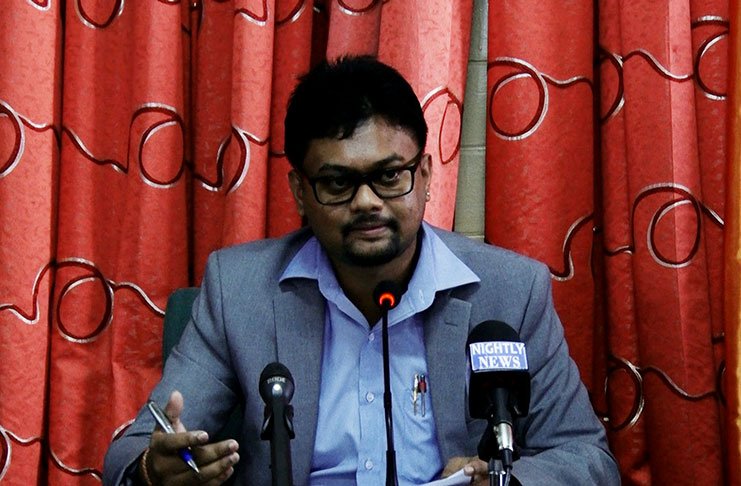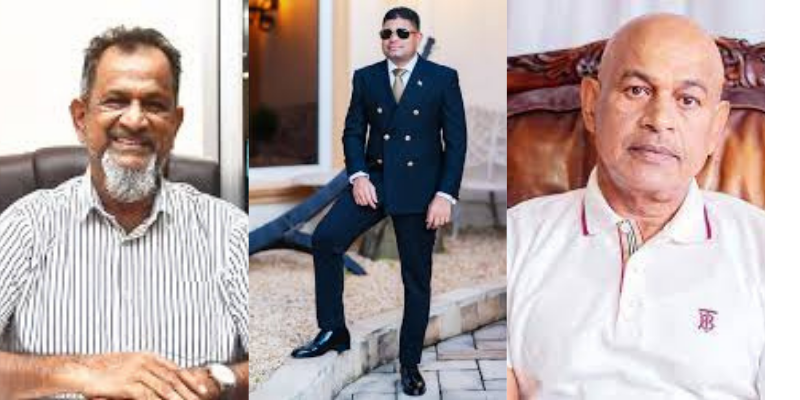Aubrey Norton, Nigel Hughes, and Terrence Campbell are relying on the 29.3% Afro-Guyanese community in Guyana to form the government. Mathematics is not their strong suit among these three Afro-Guyanese leaders. A party needs 51% to govern, yet these three Afro-Guyanese believe that the 29.3% of Afro-Guyanese alone will suffice. Of that 29.3%, over 5.1% of PNC/AFC voters have already switched to the PPP party.
The three leaders must listen to Hamilton Green, the expert in rigging elections, who allegedly suggested that they manipulate the election to secure victory. Hamilton is merely following in the footsteps of his late boss, Forbes Burnham, who manipulated elections for decades. At least Hamilton Green is honest and has done his calculations. These three leaders are obsessed with seeing an African Guyanese as President of Guyana with less than 29.3% of Afro-Guyanese voters.
It is also very evident that neither Aubrey Norton nor Nigel Hughes has prominent Indo-Guyanese leaders alongside them. Aubrey Norton has completely marginalized the Indo-Guyanese community, including Pandit Ubraj Narine, the former Mayor of Georgetown. Ubraj has a look that may deter people from voting for the PNC. No one can blame Norton for keeping this unpleasant and objectionable individual away from the voters.

The big question for Norton is whether he should ask Nigel Hughes for his list of lifelong AFC supporters and their voting database. Norton will be surprised to learn that Nigel Hughes does not have a voting base for the AFC.
Nigel Hughes’s primary objective is to seize control of the PNC party, replacing Aubrey Norton.
Guyana’s opposition party is currently in complete disarray, lacking a clear economic policy or direction for voters. Instead of focusing on a definitive plan for national development, the opposition is embroiled in an internal struggle for leadership. Three Afro-Guyanese figures—Aubrey Norton, Nigel Hughes, and Terrence Campbell—are competing fiercely to become the presidential candidate. However, their political strategies seem to be primarily focused on alleged racial politics rather than promoting national unity and inclusive governance.
A Leadership Battle Without Vision
The three contenders for the opposition’s presidential candidate position are all Afro-Guyanese and seem to rely on the 29.3% Afro-Guyanese population to secure victory in the upcoming elections. However, this approach overlooks a fundamental aspect of Guyanese politics: the necessity for broad-based support across ethnic lines. None of these leaders has made significant efforts to engage with the Indo-Guyanese, Mixed-Race, Portuguese, Amerindian, Chinese, or other communities that constitute the country’s diverse population. Their belief that only Afro-Guyanese voters can elect them as president reflects a narrow-minded and ineffective political strategy.
Aubrey Norton, the current leader of the People’s National Congress (PNC), depends on his party’s historical support base. However, history alone is not enough to win elections—policies, leadership skills, and a vision for the future are also crucial. Meanwhile, Nigel Hughes, the leader of the Alliance for Change (AFC), lacks a loyal voter base but still aspires to lead the country. The most pressing question for Hughes is how he intends to secure votes without a solid support structure. Without a lifelong and dedicated voting base, his aspirations appear unrealistic. Terrence Campbell, the third contender, is widely seen as a time-waster in Guyanese politics, lacking the necessary influence to be taken seriously as a candidate.
Hughes is attempting to position himself as the leader of the opposition by undermining Norton. His true motivation seems to involve taking over the PNC, removing Norton from leadership, and seizing control of the party to advance his ambitions. However, without support from the PNC grassroots, his quest for leadership appears to be a futile endeavor.
Racial Politics Imported from America
These three opposition leaders are employing divisive racial politics, a tactic seemingly influenced by the political landscape of the United States. In the U.S., African Americans make up only 12% of the population, rendering them the fourth-largest minority group, behind the Asian demographic. Racial politics significantly affect their efforts to shape the political landscape. The PNC/AFC use similar race card tactics to instill fear among Afro-Guyanese towards Indo-Guyanese and others. They are fabricating a racial issue that does not exist in Guyana.
However, Guyana’s demographics are different, and such an approach is not viable. The opposition’s singular focus on Afro-Guyanese voters ignores the larger Indo-Guyanese population, as well as Amerindians, mixed-race, Portuguese, Chinese, and other ethnic groups. By failing to appeal to a broader demographic, the opposition is severely limiting its chances of forming a government, with only 29.3% of the Afro-Guyanese vote. The only way the opposition parties can win is to follow the geriatric Hamilton Green’s advice by rigging the General Election and keeping the Indo-Guyanese “devils, demons, and bastards” away from power.
The PPP’s Unmatched Progress Over the Last Five Years
While the opposition remains divided and lacks a clear vision, the ruling People’s Progressive Party (PPP) has made significant progress in economic, social, and political areas over the past five years. The PPP has implemented policies that create opportunities for all Guyanese, regardless of their race or ethnicity. This inclusive governance model stands in stark contrast to the opposition’s racially charged politics.
Under the leadership of President Irfaan Ali and Vice President Bharrat Jagdeo, Guyana has witnessed remarkable development. Economic growth, infrastructure projects, job creation, and foreign investments have all surged significantly under the PPP administration. The government’s focus on national progress rather than ethnic divisions has made it the preferred choice for most voters.
The False Pretenders: Nazar, Azruddin Mohamed, and Glenn Lall

In addition to the three opposition leaders vying for power, two Indo-Guyanese individuals—Azruddin Mohamed and Glenn Lall—are also positioning themselves as potential candidates for the presidency. However, neither has a registered political party, which makes their ambitions seem unrealistic.
Nazar and Azruddin Mohamed have a serious issue with Dr. Jagdeo. The Mohameds are facing significant allegations, being accused of money laundering, gold smuggling, and tax evasion related to their luxury cars.
Reuters, as a global investigative unit, has revealed the involvement of Nazar and Azruddin Mohamed in financial crimes. The agency conducted an extensive investigation into both Nazar Mohamed and Azruddin Mohamed, uncovering substantial evidence of money laundering, gold smuggling, and tax evasion totaling over USD 50 million, along with millions in unpaid duties for luxury vehicles. Despite these findings, Nazar and Azruddin chose not to pursue legal action against Reuters or challenge the widespread adverse publicity that ensued. Why? Because both Mohameds were caught off guard by Reuters.
The world is fully aware of the accusations against Nazar and Azruddin Mohamed. Yet, Azruddin continues to persuade segments of the Afro-Guyanese and Indo-Guyanese communities that he is a victim, portraying Dr. Jagdeo as the mastermind behind his legal troubles. However, this narrative is losing credibility, as legal authorities in both the USA and Guyana are closely monitoring the situation, waiting for the right moment to act.
ExxonMobil has officially removed both Nazar and Azruddin Mohamed from its onshore project, adding to their troubles. Interestingly, instead of blaming the oil giant for their exclusion, the Mohameds are directing their frustrations toward Dr. Jagdeo. However, their attempts to shift the blame do not alter the reality of the legal scrutiny they face.
As investigations progress, it is only a matter of time before justice catches up with Nazar and Azruddin Mohamed. Their legal troubles are far from over, and soon, the full weight of the law will bear down on them. Hopefully, the government of Guyana will take appropriate action against Nazar and Azruddin Mohamed.
Azruddin Mohamed has traveled across the country, attempting to persuade people that he is not involved in gold smuggling, money laundering, or other criminal activities—accusations that have damaged his family’s reputation. However, U.S. authorities, including AFAC and the FBI, have reportedly labeled him and his father as alleged criminals, further undermining their credibility.
The sanctions imposed by U.S. authorities are clear: neither the government nor the private sector is allowed to conduct business with the Mohamed team. Should anyone violate this rule, U.S. authorities will impose sanctions on them as well.
Additionally, questions have been raised regarding Azruddin Mohamed’s importation of luxury cars into Guyana without the necessary duty payments. These concerns emphasize the lack of transparency concerning Mohamed’s political ambitions.
Why do Nazar and Azruddin Mohamed never criticize the other PPP leaders regarding their criminal endeavors? Many Indo-Guyanese are asking this question in their homes, and they know the answers. Why did these two alleged criminals specifically target Dr. Jagdeo?
Meanwhile, Glenn Lall has largely been overshadowed by Azruddin Mohamed. No one discusses Glenn Lall anymore. Lall has become an inconsequential figure in Guyana. His primary political stance appears to center on criticizing Vice President Dr. Bharrat Jagdeo through his newspaper, Kaieteur News. That, too, has turned into a tedious exercise that the public is growing tired of. Without a straightforward policy platform or governance strategy, Lall’s ambitions seem to be more about personal vendettas than genuine national leadership.
A Directionless Opposition Versus a Progressive Government
The upcoming elections in Guyana will represent a pivotal moment for the country. On one hand, the opposition remains disorganized, marked by internal power struggles, a lack of coherent economic policies, and an overreliance on racial politics. On the other hand, the PPP continues to promote economic and social development, creating opportunities for all Guyanese citizens.
The key question voters must consider is: Who is genuinely working for Guyana’s future? The opposition, fragmented and focused on self-interest, has failed to present a coherent vision. In contrast, the PPP has demonstrated tangible progress, improving the lives of citizens from all ethnic backgrounds.
To ensure a prosperous future for Guyana, it is essential to support the PPP leadership, which prioritizes national development over racial divides and political conflicts. The people of Guyana deserve governance that is inclusive, progressive, and focused on genuine economic growth—qualities that the PPP has consistently demonstrated over the past five years.





